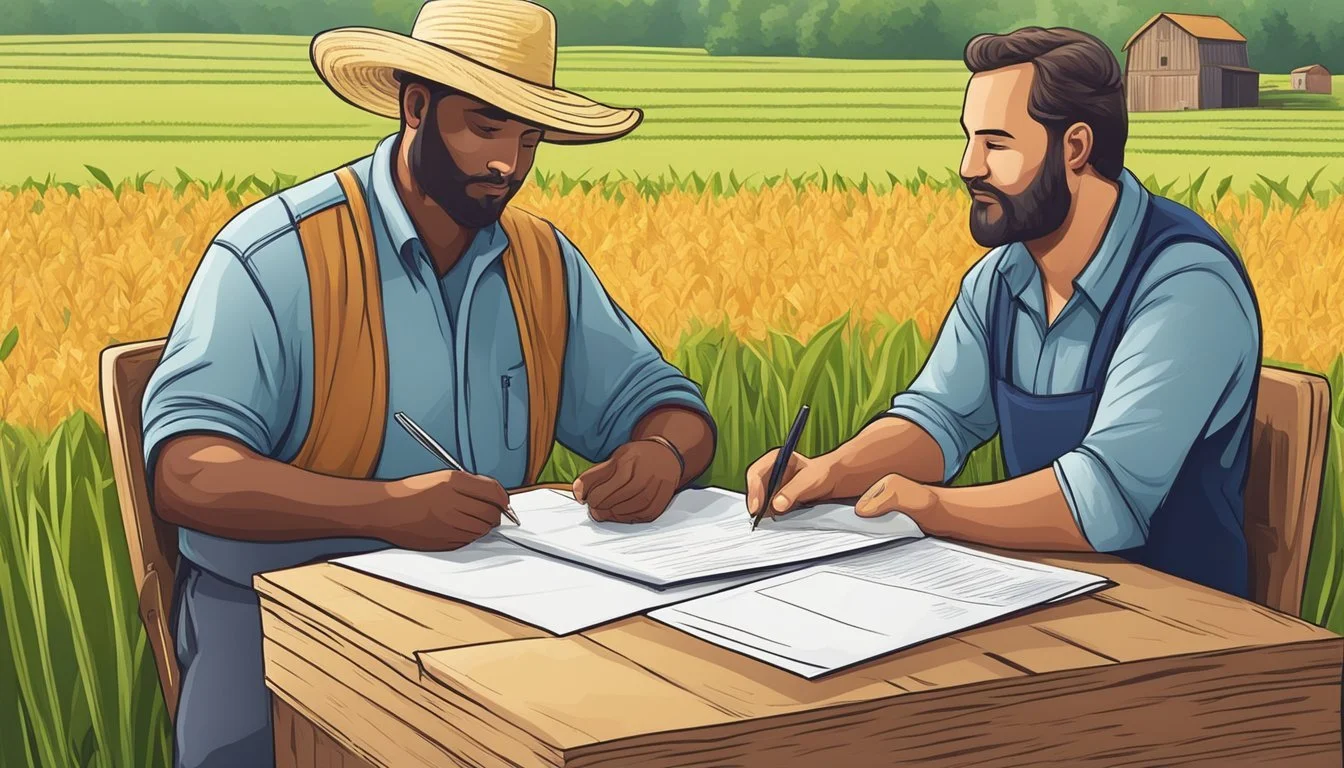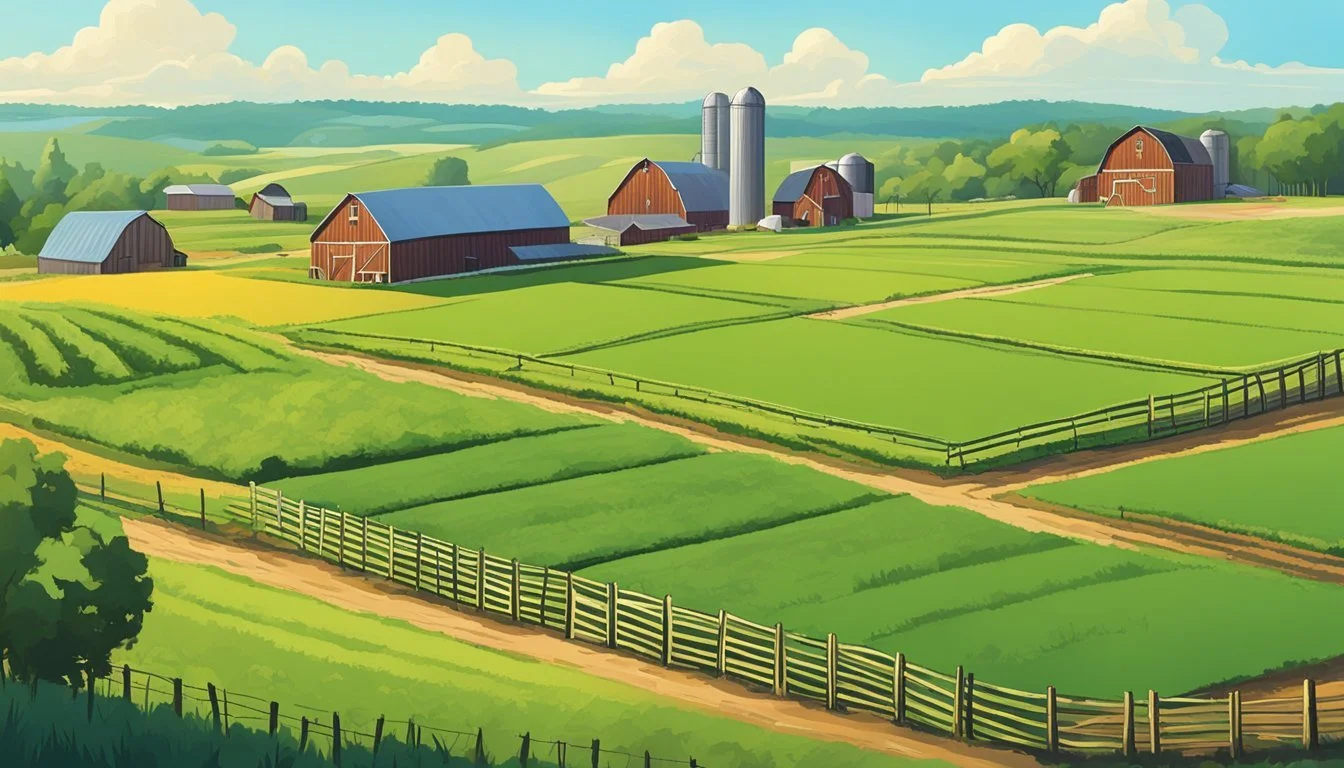Georgia Farm Land for Lease
Insights and Opportunities
This Article is Part of Our Guide on Navigating Agricultural Leases Across the US
Georgia's agricultural landscape offers a diverse array of farm land available for lease, presenting opportunities for both seasoned and emerging farmers. With its favorable climate, this southern state supports a wide range of farming activities. Leasing farm land in Georgia enables individuals and businesses to engage in agriculture without the financial commitment of purchasing property. The real estate market accommodates various needs, from small plots suitable for boutique organic operations to extensive acres for large-scale crop production.
Land lease arrangements in Georgia are versatile, catering to different scales of farming and types of produce. Potential lessees can find properties that complement their intended farming practices, whether it's pasture, cropland, or a mix of both. The availability of such land is communicated through various platforms and marketplaces, which often detail the size, location, and infrastructure of the farm land, ensuring transparency and aiding in informed decision-making.
Securing farm land on lease terms can be a strategic move for those looking to expand operations or for entrepreneurs initiating their journey into agriculture. With a rich history in farming and a supportive community, Georgia stands out as a state that can offer valuable real estate opportunities for those interested in cultivating the land on a lease basis.
Understanding Farm Land Leasing in Georgia
In Georgia, leasing farm land can offer flexibility and financial advantages for both landowners and farmers. This section explores the key aspects of farm land leases in Georgia, from the varieties of agreements available to the legal nuances that govern them.
Types of Leases for Farm Land
Leases for agricultural land in Georgia typically fall into three categories:
Cash Rent Lease: A fixed payment is made to the landowner, often on an annual basis.
Crop Share Lease: The landowner and farmer share the costs and revenue from the crops, usually in proportion to their contributions.
Flexible Lease: Rent adjusts based on predetermined factors like commodity prices, yields, or revenue.
Each type of lease can impact the rent amount, which can vary significantly based on the county and whether the land is irrigated or non-irrigated.
Benefits of Leasing Over Buying
Leasing farm land in Georgia offers several benefits:
Lower Initial Capital: Farmers can access more acres without the high initial investment required to buy land.
Flexibility: Lease agreements can be tailored to fit the farmer's business model and financial capacity.
Risk Management: Sharing the investment reduces individual risks associated with outright ownership.
Legal Considerations in Leasing
Legal considerations are pivotal in agricultural leases:
Lease Agreement: A clear, written contract outlining all terms is essential to avoid misunderstandings.
Owner Finance: Some leases may include an owner-financing option, providing an alternative path to ownership.
Compliance: All agreements must adhere to local and state regulations to ensure they are enforceable.
Finding Farm Land to Lease in Georgia
Georgia offers a variety of agricultural land for lease, providing opportunities for farming ventures ranging from tillable acreage to pastureland. The Landcashin marketplace and its Deal Alert program are valuable resources for locating such properties, while understanding listing prices is essential for making an informed leasing decision.
Landcashin Marketplace Overview
The Landcashin marketplace is a platform that lists a variety of farm land for lease across Georgia. It allows prospective leasers to browse through various properties, each with details regarding the land's size, terrain, and potential uses.
Average Listing Age: 122 days
Average Lease Rate: $1,375
Median Lease Rate: $1,375
Average Property Size: 17.1 acres
These specifics help lessees gauge current market conditions and make comparisons to find a lease that suits their agricultural needs.
Utilizing the Deal Alert Program
The Deal Alert program provides a tailored experience for users looking for specific types of land to lease. By joining this program, users receive automatic notifications when a property matching their criteria becomes available.
For example:
Interest: Organic Farming
County: Morgan
Alert Received: Organic Farm • 10.0 acres • Morgan County
This feature ensures that users remain informed about the latest offerings in desired locations or suitable for particular farming practices.
Understanding the Listing Price
The listing price is a crucial factor when considering leasing farm land. It typically reflects the land's value, size, and agricultural potential. In Georgia, rates have varied historically, with more recent figures indicating an average of $208 per acre for irrigated cropland and $67 for non-irrigated cropland.
Cropland Type Average Rent per Acre Irrigated $208 Non-irrigated $67
These averages offer a baseline for comparison, helping lessees to form realistic budget expectations for their agricultural pursuits in Georgia.
County-Specific Information
When exploring farm land lease options in Georgia, it's important to consider the unique offerings and market conditions in various counties. Each county has distinct characteristics influencing their respective land lease markets.
Clarke County Farm Land
In Clarke County, the focus is on small to mid-sized tracts of land suitable for diverse farming practices. It's common to find properties like a 1.5-acre plot, indicative of the county’s offerings. This size is manageable for new entrants into farming or for those looking to expand their operations modestly.
Madison County Opportunities
Madison County, central to Georgia's farming landscape, presents opportunities such as organic farms available for lease. A notable listing includes a 10-acre organic operation in Morgan County. This demonstrates Madison County's facilitation for sustainable agriculture and small to medium-scale farming enterprises.
Marion County Market Insights
The market in Marion County reflects a demand for variety in farming leases. There is no specific listing provided in the search results for Marion County. However, prospective lessees can expect to encounter a range of property sizes and types due to the county's diversified agricultural framework. It's advisable for those interested to seek local listings or engage with county-specific programs to find suitable land that meets their criteria.
Financial Aspects of Farm Land Leasing
When leasing farm land in Georgia, understanding the financial intricacies is crucial. The agricultural lease's two main financial concerns are the rent and lease terms and the costs incurred per acre.
Assessing Rent and Lease Terms
Rent for agricultural land varies based on location, land quality, and the current market's demand and supply. Georgia's farm land rent can range from $20/acre min to $200/acre max annually, reflecting varied land quality and utility. Lease terms should be mutually agreed upon, typically ranging from a single year to several years, and should be documented meticulously to avoid future disputes.
Calculating Costs per Acre
Calculating costs per acre is essential for both the lessor and lessee to ensure the lease agreement is financially viable. Costs can include but are not limited to:
Fixed Costs: such as property taxes and basic maintenance, typically falling on the lessor.
Variable Costs: like planting inputs, irrigation, and labor, which the lessee often incurs.
A simple table can illustrate potential costs per acre:
Fixed Cost Type Estimated Cost/acre Property Tax $5 - $25 Maintenance $10 - $50
Variable Cost Type Estimated Cost/acre Seed and Fertilizer $50 - $300 Fuel and Irrigation $25 - $100
These figures are hypothetical and should be adjusted based on actual conditions and market rates. Both parties must perform due diligence to ensure the lease's profitability and sustainability.
Types of Farm Land Available
Georgia boasts a diverse array of farm land for lease, each suited to different types of agricultural and recreational uses. Prospective lessees can find properties that cater specifically to commercial farming, cattle and pasture management, as well as land that's appropriate for a variety of recreational and acreage uses.
Commercial Farm Land for Lease
Georgia offers commercial farm land that is tillable and well-suited for crop production. These lands are primed for agricultural businesses that focus on row crops, vegetables, or specialty crop farming. On average, prices for these leases can greatly vary depending on factors such as location, soil fertility, and available facilities.
Cattle and Pasture Land
For livestock operations, Georgia provides ample pasture land suitable for cattle grazing. These lands are typically spacious, offering both natural forage and the infrastructure necessary for cattle ranching, such as fencing, watering systems, and shelters. The state also sees a range of cattle pastures from smaller acreage to large-scale leases to fit various herd sizes and ranching approaches.
Recreational and Acreage Uses
Beyond commercial and cattle farming, Georgia's farm land for lease often includes properties ideal for recreational purposes. These might encompass hunting grounds, fishing, or simply conservation acreage where one can enjoy the tranquility of nature. Some tracts may be multi-use, pairing tillable land with sections reserved for recreational activities, giving lessees a versatile land use experience.
Status and Conditions of Leases
In Georgia, farm land leases maintain a status that reflects current market conditions and agricultural practices. Landowners may offer a range of lease terms, with some providing owner financing to facilitate access to land for prospective farmers without the upfront capital typically required.
Lease conditions often stipulate the minimum acreage required for operations to ensure the land's agricultural potential is fully utilized. Foreclosures can affect the availability and terms of leases, potentially offering opportunities for different terms, yet they bring a level of uncertainty regarding the tenure of the lease.
Residences on farm land can influence lease conditions. Properties with existing dwellings might be subject to additional terms concerning the use and maintenance of those facilities.
The status of farm land for lease in Georgia, as of the latest data, does not indicate a significant presence of foreclosed properties in the leasing market. Here is a brief overview of the leasing conditions:
Status Owner Finance Foreclosed Residence Min Acres Land for Sale Active Leases Available Minimal Varies Typically 10+ Not applicable Lease Conditions Customizable Possible May affect Defined by lease Not applicable
Prospective tenants must carefully review lease agreements to understand the precise terms, any minimum acreage requirements, the potential for owner financing, and the implications of any foreclosed status on the land. The landscape for farm land leases in Georgia is characterized by its adaptability to both small-scale and large-scale farming operations.






